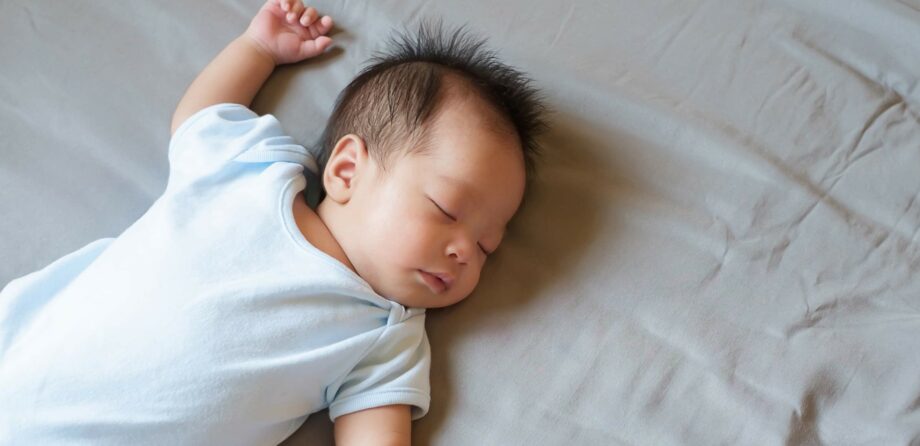
Safe sleep in nurseries
Experts believe that good sleep habits can be learned so the early years is the best time to get started.
Sleep is vital for a healthy lifestyle, resetting our brain and body, helping us combat illness and stress.
The science bit
Around four in ten children suffer from sleep issues – eight in ten for children with additional needs. Lack of sleep impacts our physical and mental health, our ability to concentrate and communicate. Scientists say we could survive three times as long without food as we could without sleep. It’s important to get the right quality of sleep as much as the right amount. A good night’s sleep is between six and ten hours for adults, ten to 13 hours for children aged one to five.
Children’s sleep
Sleep is essential for children’s growth and development. It helps them learn, problem-solve, react, develop lasting memories, be sociable and happy. Good sleep also supports their immune system, making them less susceptible to illness.
Sleep deprivation can cause hyperactivity and other behavioural problems and can damage mental and physical development. Poor sleep habits from an early age lead to long-term sleeping problems.
Let’s celebrate our beds!
It’s never too late to learn good sleep habits. If you can normalise sleep as part of a healthy lifestyle during a child’s early years, that lays the foundations for a lifetime of good sleep. Have conversations with children around sleep in a positive, celebratory way:
- Discuss bedtime routines – what happens at bedtime?
- Role play baby’s bedtime – bathing dolly, dressing for bed, feeding the dolly
- How do they recognise when they feel tired and take time to be calm and relaxed?
Get into a routine
Children – and adults! – who have a daily positive bedtime routine are likely to be ready for sleep. It’s useful for parents to consider the following advice from The Sleep Charity and NHS:
- Start winding down an hour before you go to bed
- Avoid screens which can suppress the sleep hormone melatonin and avoid exercise late in the day
- Enjoy a light bedtime snack – avoid caffeine and fizzy drinks from late afternoon – and no sugar or fruit – good sleepy foods include dairy, cereal or bananas
- Cheese doesn’t give you nightmares! So enjoy a piece of cheddar
- Dim the lights and take a warm bath
- Try hand-eye co-ordination activities to relax – jigsaws, colouring or a craft activity
- Create a comforting sleep environment in a dark, cool bedroom
- Settle in bed with a calming bedtime story
- Have a set wake-up time for mornings.
Safer sleeping in nurseries for babies
For babies, there is a very small risk of sudden infant death syndrome (SIDS).
Millie’s Mark, the gold standard in paediatric first aid, has recently added new criteria for achieving the award around safe sleeping. Settings must provide suitable bedding and staff deployment during sleep times.
Regulatory frameworks refer to frequent checks on sleeping children and ensuring that cots/bedding are in good condition and suited to the age of the child. For settings in Wales and England, refer to The Lullaby Trust sleep awareness guide. For those in Scotland, follow the NHS Scotland guidance on sleeping safely.
What causes SIDS?
It’s likely to be a combination of factors but any risk can be significantly reduced by:
- Placing babies on their back for all sleep in their own separate space. These include moses basket, cot, travel cot, carry cot with firm, flat mattress. Nests, pods or beanbags are not suitable
- Keeping the room temperature to between 16 and 20 degrees – record and document this. Do not place a baby next to a heat source or in direct sunlight
- Placing them in a sleep bag or firmly tucked in sheets/blankets up to shoulder height. Put your hand on their chest or back of neck and if they feel sweaty, remove a layer. Avoid swaddling
- Supervising sleeping babies – this is down to the nursery’s judgement
- Offering a dummy if babies use them, but don’t put it back in during sleep
- Placing them foot to foot (at bottom of cot) so they can’t wriggle under bedding
- Not dressing babies in hats or outdoor wear unless sleeping outside
- Placing babies who fall asleep in car seats and push chairs onto a flat, firm surface when possible.
Practitioners and parents/carers need sleep too
Practitioners must practice what they preach! Even though your job can be tiring, it doesn’t necessarily mean you will be able to sleep well. The Sleep Charity reported that a fifth of adults slept poorly on a regular basis. A good night’s sleep means adults cope much better with tough days and stress so don’t ignore your body!
Even if you are a good sleeper, it’s still important for you to be aware of your sleep routines and continue to make it work. Parents and carers will often be sleep deprived to some extent, especially if their child has additional needs or a disability, so try to be understanding and patient.
For those who don’t generally sleep well, don’t accept your lot, seek help.
Everybody can enjoy the benefits of sleep, so don’t lose hope. It is usually a mismatch between the sleep/wake homeostasis (your body feeling tired/awake), the circadian rhythm (internal body clock) and/or the environment that is the problem.
It’s worth reading the helpful resources in the Adult section of The Sleep Charity website. If it’s affecting your health, tell your GP.
Coping during tough times
Prolonged amounts of stress can cause difficulty sleeping because your heart rate increases and your brain becomes alert. This can cause a downward spiral of less sleep and more stress.
Drinking alcohol and smoking impact badly on sleep. Other factors include being disturbed by a partner, being a parent or carer, ageing and the menopause. Some people also suffer from long-term sleep disorders such as insomnia and sleep apnoea.
There’s a close relationship between sleep deprivation and anxiety/depression so it’s crucial that you get professional advice and try to reverse the cycle. This includes trying to eliminate or tackle the cause of your stress, incorporating coping strategies to manage your stress such as exercise and trying to find ways to relax.
Poor sleep
Sleep is not a passive process – we experience complex changes in brain activity.
REM sleep promotes brain development, this is when emotions are processed and memories consolidated. Non-REM sleep is restorative, your body repairs itself and rests.
If you don’t have enough sleep your body ramps up your “fight or flight” response to stress. If you get less than six hours of sleep a night you are significantly more at risk of stroke and heart disease.
Signs of poor sleep:
- Taking ages to fall asleep in the first place
- Waking up several times in the night
- Unable to fall back to sleep within 20 minutes
- Feeling tired and lethargic in the morning.
Safer sleep resources
- Safe Sleep Policy for nurseries in England, Scotland and Wales
- Lullaby Trust Safer Sleeping Guide
- Lullaby Trust helpline 0808 802 6869
- Scottish Government ‘Safer sleep for babies guide for professionals’
- Scottish Cot Death Trust ‘Early Years Safe Sleeping Guide’
- The Sleep Charity
- NHS sleep guidance.
This article was originally featured in our Winter 2023/24 Nursery News magazine.
Similar Articles
STEMinists in the making: Encouraging girls’ confidence in science

Early years activity: Pancake creations


